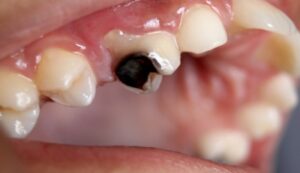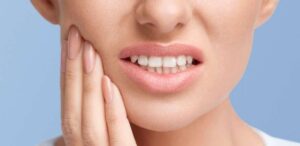A toothache, also known as odontalgia in medical jargon, is pain or discomfort in or around the tooth. Commonplace in children and adults, it may range from mild to moderate intensity, leading to severe pain in the mouth. The pain from a toothache often becomes unbearable when it involves infection or irritation by bacteria around the dental nerves inside the tooth.
Causes
There are numerous pathogenic and non-pathogenic reasons why a person may experience a toothache. Let us discuss some of the most common causes that you may experience.
Cavities
Cavities or dental decay is perhaps one of the most common causes of toothache. It has a recurring nature if not dealt with promptly.
Also known as caries in dental terminology, it is the loss of tooth structure through bacterial invasion. Many factors lead to the development of dental caries; poor oral hygiene, improper or inadequate brushing, and sugary diets are a few of the reasons why they may occur.

Eventual or constant neglect in proper oral hygiene can lead to tooth decay which can expose the nerve endings of your tooth, leading to severe discomfort and increased sensitivity to hot and cold extremes.
This pain is aggravated upon lying down and is one of the most common reasons for excruciating dental pain that keeps you up at night.
Gum Disease
Another probable cause for nocturnal toothache may arise from gum disease. Periodontal Disease or Gingivitis is a dental condition that can cause radiating pain in the surrounding area of the tooth, which can radiate to nearby structures. It can also lead to sore, red, and swollen gums. In acute or advanced stages of periodontitis, a patient is likely to experience bleeding from the gums while brushing the teeth.

Pulpitis
The inflammation of the pulp is known as Pulpitis, and it occurs when tooth decay and bacterial invasion traverse the deeper layers of the tooth, infecting the pulp. The pulp is a dense collection of blood vessels and nerve endings, making it highly susceptible to pain and pressure.
This infected pulp then becomes inflamed and causes swelling, increasing the pressure within the root canal inside the tooth.
The compression of the nerves and blood vessels leads to severe and sharp throbbing pain. One of the most common symptoms of pulpitis is the inability to sleep due to persistent throbbing pain.
Trauma
Any type of physical damage inflicted upon the teeth is known as dental trauma. A cracked, broken, or chipped tooth, which can often go unnoticed, can cause mild to severe toothache, depending on the extent of the damage. It can also cause hypersensitivity in teeth.

Damage or injury at or near the Temporomandibular Joint can also lead to the development of toothache. Bruxism (involuntary grinding of the teeth) can also pressure the nerve endings, eventually leading to tooth pain.
All of these injuries can be possible contributing factors to disturbed sleep due to pain.
Systemic Diseases
On most occasions, systemic diseases such as Sinusitis or Ear Infection lead to a complex interplay of reactions that may end up causing a toothache. The build-up of pressure due to mucus in the sinuses may exert pressure on the upper molar region, causing tooth pain. Hypertension can also play a role in causing the tooth pain, as increased blood flow towards the tooth can lead to an increased thermal response of the tooth.
Remedies
Let us now discuss some common remedies for extreme tooth pain that isn’t letting up and disturbing your sleep. Since most dental interventions won’t be possible at night, these remedies should help you get through the night.
Cold Compresses
This is the most common remedy one can perform when suffering from toothache. In this method, one should wrap an ice pack in a clean towel, cloth or tissue and apply it on the affected side of the face for around 10 minutes.

This method constricts the blood vessels present inside the tooth, which can provide temporary relief for the time being.
Keep your Head Elevated
This is another effective method since it prevents blood flow towards the affected tooth, which decreases the pressure on the pulp space of the affected tooth and hence provides temporary relief.
In this method, just stack up several pillows and prop your head on top to keep it elevated and restrict blood flow to the offending tooth.
Diet Control
Consuming hot, cold, acidic, or sugary foods and beverages can aggravate the already persisting tooth pain due to a cavity. To prevent this, avoidance of the consumables mentioned above is highly advised to alleviate pain.
Mouth Rinses
If a mouthwash containing a disinfectant or a numbing agent (particularly alcohol or salt) is present, then use it to kill any bacteria around your tooth that may be causing pain.

If mouthwash is unavailable, warm saline rinses will serve as an excellent remedy to alleviate your toothache.
Amongst herbal remedies, clove-oil-soaked cotton acts as a pain obtundent and is highly effective in relieving extreme tooth pain.
Non-prescription Pain Medications
If all else fails, you can take over-the-counter pain medications like Tylenol or Ibuprofen to relieve pain and last through the night.
Words of Wisdom
Excruciating tooth pain that isn’t letting you sleep isn’t something to sit on. Contact your dentist immediately and book an appointment to receive adequate treatment to resolve the problem. Your dentist will advise whether you need a root canal treatment or extraction to resolve the pain.
